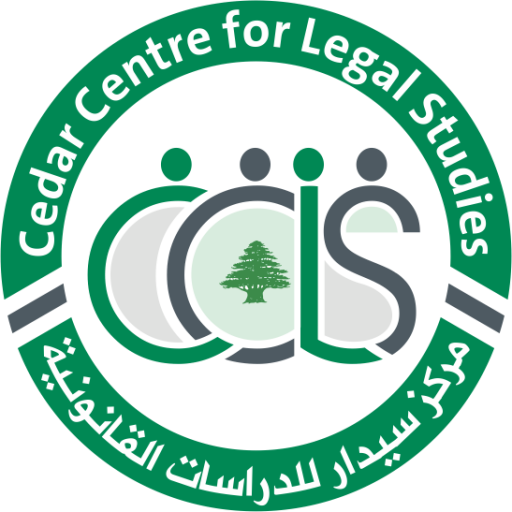Cedar Centre for Legal Studies Hosts Two Roundtables on Irregular Migration in Northern Lebanon
October 2025
The Cedar Centre for Legal Studies (CCLS) convened two roundtable discussions in Tripoli and Minieh, Northern Lebanon, on 22 and 23 October 2025. These roundtables brought together stakeholders and local decision-makers from various sectors to address the growing phenomenon of irregular maritime migration from Northern Lebanon, exploring its implications, risks, and the associated humanitarian and social challenges.
Participants included representatives from the municipalities of Beddawi, Qalamoun, and Minieh, officials from the Ministry of Social Affairs; security agencies including officers and state security personnel, local and international NGOs, media, religious leaders, and other key actors.
In recent years, Lebanon has witnessed a significant rise in attempts to migrate by sea toward Europe, with increasing threats to the lives of migrants during their journeys. Many of these individuals depart from Northern regions, particularly Tripoli, El Mina, Qalamoun, Bebnine, Arida, and Akkar, in pursuit of better opportunities and a more stable future. Tragically, these voyages often end in humanitarian disasters, with numerous children, women, and men lost at sea, and many still unaccounted for. Migrants remain the most vulnerable link in this equation, caught between the exploitation of smuggling networks and the perils of the sea, compounded by a lack of awareness and safe travel guidance.
In response to this reality, CCLS invited representatives from governmental and security bodies, local authorities, municipalities, NGOs, media outlets, and religious institutions to engage in an open dialogue aimed at evaluating current interventions, identifying gaps, and developing joint strategies and action plans to protect civilians and reduce dangerous journeys, exploitation, and human trafficking.
Mr. Saadeddine Chatila, Executive Director of CCLS, emphasized that irregular migration is both a national and humanitarian challenge requiring genuine collaboration among all concerned parties. He affirmed that these discussions represent a critical step toward unifying efforts and shifting from fragmented reactions to proactive solutions focused on safeguarding individuals and communities.
Mr. Chatila also presented the centre’s ongoing initiatives in Tripoli, which include awareness and advocacy campaigns on the dangers of irregular migration, legal support services, and case follow-ups. He highlighted the recent launch of a rehabilitation centre for survivors of torture, offering comprehensive services such as psychosocial support, medical care, and physical therapy for vulnerable individuals and survivors of abuse.
He underscored the legal centre’s role in tracking irregular migration cases and supporting victims and their families, citing several cases handled by CCLS, including the tragic sinking of the April boat off Tripoli’s coast, and incidents related to Cyprus and Tartus—events that continue to leave deep scars in the collective memory of Lebanese society, particularly in Tripoli.
The roundtables began with a welcoming address from the CCLS team, followed by introductions of participants representing a broad spectrum of local actors in the North. A brief presentation of recent data on maritime migration trends was shared, including statistics on the number of journeys, commonly used routes, and victim counts. The session also reviewed key local initiatives aimed at civilian protection and raising awareness around irregular migration.
The Facilitator, Rabih Omar then led an in-depth discussion on the current state of irregular migration, examining its causes and consequences, the most affected groups, and alternative approaches to mitigate the phenomenon. Participants explored priority areas for future action, the roles of municipalities and security agencies in controlling the issue, and the social responsibility of local associations and civil society organizations in raising awareness and providing support.
The role of religious leaders in advocacy and awareness was also addressed, alongside the need for comprehensive plans to tackle the root causes of irregular migration from social, economic, and humanitarian perspectives, ensuring community resilience and reducing the risks that compel individuals to embark on perilous sea journeys.
Throughout these 2 roundtables, participants proposed practical and innovative ideas for collaboration, including joint awareness campaigns, livelihood support programs for at-risk communities, and the development of inclusive national plans to curb irregular migration. These efforts are especially critical given the persistence of migration attempts by some citizens despite awareness of the dangers, driven by despair and slogans such as “This way or that way, we’re dead” and “It’s hit or miss”.
CCLS distributed informational poster outlining the services it offers to victims’ families and individuals considering irregular migration. These include legal support, advocacy activities, and the dissemination of the centre’s helpline hotline, intended for circulation within marginalized communities affected by this issue. The centre also presented its report titled “Syrian Refugees in Lebanon: Between Discriminatory Policies, Hate Speech, and ‘Death Boats’ the Root Causes of Irregular Migration in Lebanon”, this report is prepared by Dr Marie Kortam the head of the policy study and research program at CCLS, to highlights the socio-economic and political drivers behind illegal sea travel and aims to raise awareness and offer practical recommendations to address the phenomenon.
The roundtables concluded with a set of actionable recommendations proposed by attendees, with the hope of translating them into tangible steps in Lebanon—despite the prevailing sense of despair and loss of hope among Lebanese citizens due to the dire economic and social conditions. Nevertheless, the meetings offered a glimmer of hope and a space for constructive dialogue, reaffirming that cooperation and joint planning remain possible in the pursuit of human dignity and protection.
Through these activities, the Cedar Centre for Legal Studies (CCLS) reaffirms its commitment to fostering dialogue on public policy, enhancing protection for affected communities, and advocating for safe and legal alternatives to irregular migration.
